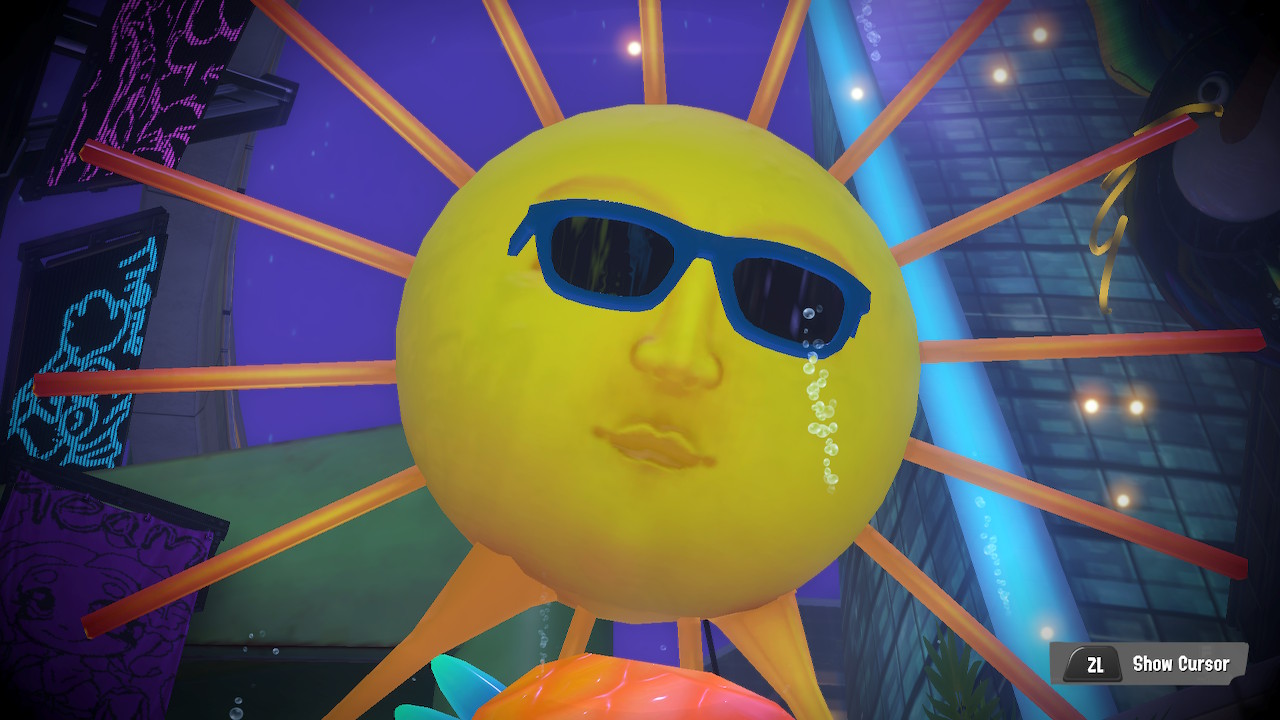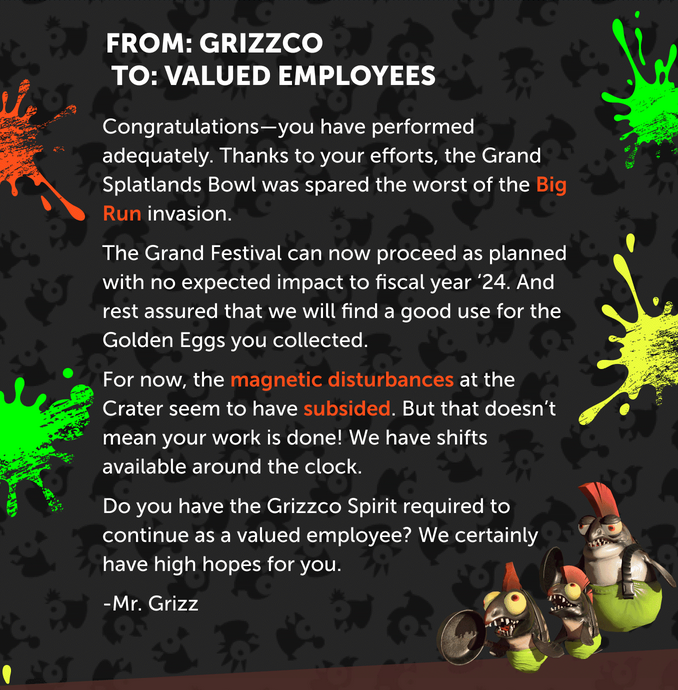Splatoon 3 post(?)mortem and the furnished arena
October 04, 2024

The Grand Festival, presumably the last big, bespoke event of Splatoon 3, ended on the evening of September 15, 2024, if you live in an American timezone.
The sense of mournfulness around a Splatoon's transition into a state of server maintenance is always a little more exaggerated than with other Nintendo properties, despite the company's never updating any game for more than about two years. I lost track of how people talked about it on social media, but conveniently the game lets players post little drawings of their squid kids crying and waving goodbye directly inside it, so you could get a sense of this just by wandering around the hub zone.
Is it just that these are primarily online multiplayer experiences, ones that involve splatting your friends or being splatted beside them? It's true that events in online games provide a semi-regular series of excuses for friends to do a thing together, as splatfests did for the group of friends I play games with. And vocal communities of queer fans in particular use these games as fanwork material. But it's also true that Nintendo didn't unplug the servers from the wall on September 16. They ended online support for the first game on April 8, 2024, after almost nine years, long enough that adults at the time could claim to have grown up with that game, could look back at it through the sticky pathogenic film of nostalgia. For a while yet we'll be able to turn on Splatoon 3 and join a match, at least the two-thirds of the time when it doesn't lose connection during matchmaking. Also, the Switch news post about all this ("Thanks for all the splats!") says,
...[Y]ou can look forward to returning seasonal Splatfests, Big Runs, and Challenges comin' your way.
Which, maybe because they want a break from making Splatoons for a while, is more than they promised for the first two, granting that Splatoon 2 had those impromptu covid lockdown fests. In this and other ways it seems like they're trying to talk around the issue of the wind-down because, ultimately, Miyamoto doesn't want to convert the Splatoon 3 servers into ethereum mining rigs, he wants to keep selling copies of Splatoon 3.
Maybe this is as simple as an online game enabling more opportunities to cultivate emotional investment. The in-game posts function like this, all those tearful farewells popping up all over the place because, obviously, Nintendo allows them to, and rewards the effort by stamping them on walls and things. And after the last big run, they sent the following to one of my actual real-life email addresses:

Not sure about the strategy of RPing as your boss at your part-time job. But we all love Grizz, the big goopy bear. You love Grizz, right? He's a character, and Nintendo's artists design the hell out of those.
I don't have all the information needed to explain why Splatoon 3 is or was the locus of any particular kind of social activity, why people liked it as much as they did in the way that they did during the window of active support. What I know is that Nintendo employs people who are very good at making pretend places you want to spend time in, and that they managed to make me feel this way about the environments in a team shooter three times is remarkable bordering on miraculous. Microsoft and Tencent could never. Valve games did it when they were quasi-official mods structured as collections of community-run servers and not live service nightmares, but that Valve is dead and buried, or I guess viking funeralled into the sea on a burning yacht.
We have a few options if we want games to be something other than pure manual challenges or film/novel analogues. Maybe challenge in the form of "unfair" mechanical specificity can gesture toward a broader meaning--this isn't my thing personally, but it's an idea worth exploring. Maybe short narrative games, absent the obligation to pretend to be movies or to beat the wordcount of War and Peace like it's a high score, can chart their own little paths. Or maybe meaning can arise from the act of being in the virtual space.
Walking simulators, Bitsy games, and various "cozy" experiences work with that last idea at different scales in a single-player context. But I find multiplayer online worlds especially compelling, maybe because they have the tools of public space at their disposal, or because in being public the overall experience is always a little accidental. Or maybe because one of my formative experiences was Ultima Online.
Though it cashed in on precedents set by the earlier Ultima games, the games that inspired Todd Howard to fill houses with stealable tableware, I don't think any game before or since has conveyed a sense of existing in its world quite like the early versions of UO. This probably isn't even replicable insofar as UO achieved it by providing few incentives to do anything, and it's hard to imagine something like that now without some kind of exploitative gambling loop attached. But whatever the reason, I spent quite a lot of time in Britannia just kind of wandering around and looking at things.
 Every time I think about UO I want to go back to it, but the problem with free servers is you have to either subject yourself to hardcore PvP or be content with an active player base of about 11 people.
Every time I think about UO I want to go back to it, but the problem with free servers is you have to either subject yourself to hardcore PvP or be content with an active player base of about 11 people.
I was, I guess, a young teenager, too impatient to level my characters to the point of perfection and too shy to find a guild to hang out with or to RP in public apropos of nothing. The combat was weird and frustrating anyway, even for its time. You could take advantage of exploits sometimes--e.g., the Bone Knight Room, a room in a dungeon with some skeleton spawners in it, where a few players would block the doorway and the rest could grind by either attacking the skeletons from relative safety or healing anyone who needed it. But otherwise efficiently leveling skills involved, like, casting spells on your boat while sailing across invisible map boundaries for some reason I can't remember, and I wasn't interested in that. Mostly what I did was walk around and look at people's houses like it was fantasy world Geocities. I raised enough money to buy my own house by making and selling runebooks, essentially collections of teleportation map markers, which wasn't very exciting but didn't involve much risk of dying in a hole somewhere and losing all my stuff. But this was right around when EA began hollowing that game out like a jack-o-lantern rendering of Chuckles the jester, so I didn't have much time to enjoy it.
You didn't have to make your own fun the way I did if you wanted to explore the world without fighting much. You could:
- Mine rare ore in far-flung locations, contributing to a player-crafted item economy driven by the disposability of most items
- Spec into lockpicking and follow treasure maps all over the place, though this usually required combat-oriented friends to defend you
- Beg--as in, there was literally a begging skill you could use on NPCs, and while the time-to-money ratio wasn't great, some people became very efficient about hitting every town in a certain order, etc.
Even if they did give you the tools to make something out of it, I don't know that UO deliberately wielded its map to communicate anything other than maybe Raph Koster's design ethos. And I want to be careful about romanticizing the idea of virtual space that replicates the inconvenience of physical space given that the web 3.0 metaverse version of this idea sucks industrial quantities of ass. But I can't deny that all that persistent space with its player houses and its monsters and screaming deer affected me in some kind of way.
The Nintendo pivot represented by the DS and then the Wii was less about game space than about real space, the effort to pitch the company as the Apple of games and its consoles as wholesome living room fixtures rather than masturbatory aids for lonely teens. But their adroitness with gameworlds probably helped.
The Iwata Asks interview about the first Splatoon suggests that the inciting motivations were mechanical:
Nogami [...] We weren’t invested in creating a new character. We just set out to create a game with a new structure.
Iwata That’s very important. The way that (Shigeru) Miyamoto-san and the EAD make games, the idea comes not from the design, but from the function. The design comes after.
Nogami That’s right.
Iwata So you don’t approach making a game because you want to use a certain character.
Nogami Right.
Not to mention that Hisashi Nogami worked on some of the Wii and Wii U's UI. These developers were deeply cognizant of user experience as a thing you do with your hands. But bear in mind that this is the same Hisashi Nogami who did Animal Crossing, and one of his contributions to the Wii was the Mii Channel.
Sakaguchi Even the decoration of the stages reflects the staff’s taste.
Inoue Right. For example, if there are stickers on the wall, the stickers are put on in a way that you can tell that someone put them there because they wanted to. We’ve really filled the game world with "things that someone loves," so I hope people will pay attention to all the little details.
Nogami I hope that they don’t get too caught up in just inking things, and are able to enjoy the little things.
The priorities behind Nintendo games tend not to include striking the player against the setting to produce sparks of individuated human truth. But the idea that the environment can make you feel a certain way is in there, in how Splatoon stages aren't just concrete walls and crates, in decorating your locker, in dressing up your character and walking around a cityscape populated by other people's dressed-up characters. If I want anything out of Splatoon 4, it's more of this, more coexisting, whether that takes the form of a little apartment your friends can visit, a co-op story mode, or something less synchronous. The memories that define Splatoon for me aren't big plays or accomplishments, but running out of steam in turf war or salmon run but not wanting to turn the game off, still wanting to be there.